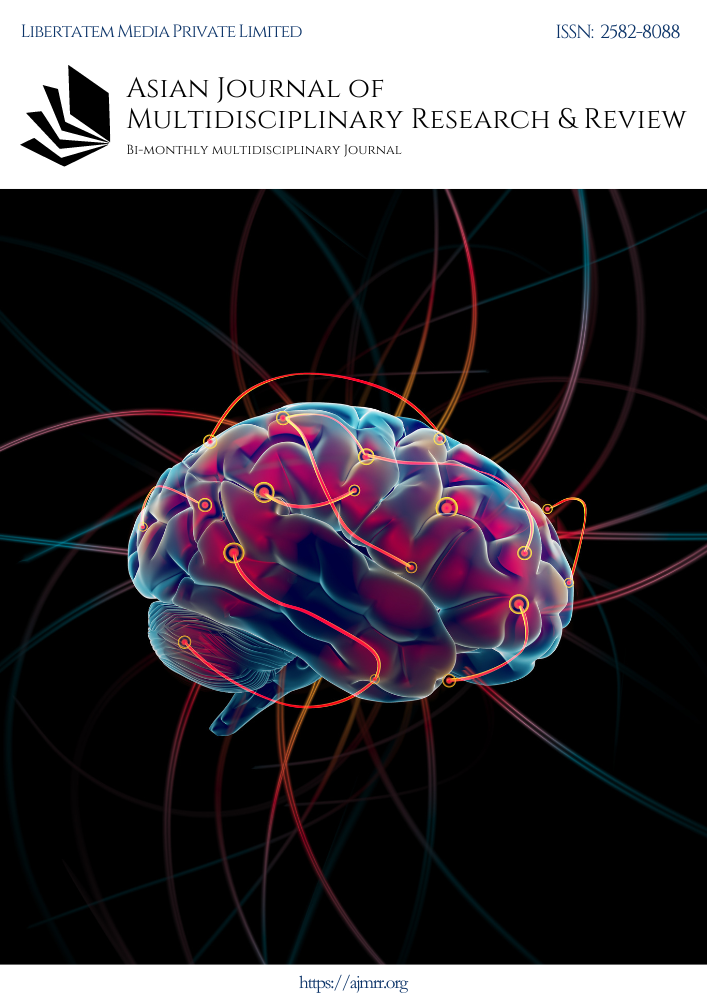AI Integration In Precision Health - Advancements, Challenges, And Future Prospects
Keywords:
Precision health, AI integration, healthcare, advancements, challenges, future prospectsAbstract
Precision health, characterized by personalized healthcare strategies tailored to individual characteristics, has witnessed a transformative impact from AI integration. This paper explores the current advancements, challenges, and future prospects of integrating AI technologies into precision health, aiming to provide insights into the evolving landscape of healthcare delivery.
Advancements in AI have significantly enhanced precision health practices, particularly in diagnostics, treatment selection, and disease monitoring. Machine learning algorithms, fueled by vast datasets, can analyze complex biological and clinical information to identify patterns and predict outcomes with remarkable accuracy. For instance, AI-driven image analysis has revolutionized medical imaging interpretation, enabling early detection of diseases such as cancer. Moreover, AI-powered genomic analysis can unravel intricate genetic variations, paving the way for personalized treatment approaches.
Despite these advancements, several challenges hinder the seamless integration of AI into precision health. Data privacy concerns, interoperability issues, and ethical dilemmas surrounding AI decision-making are critical challenges that require careful consideration. Ensuring the reliability and interpretability of AI algorithms is paramount to fostering trust among healthcare providers and patients. Additionally, the integration of AI into clinical workflows demands significant infrastructural and organizational changes, posing implementation challenges for healthcare systems.
Looking ahead, the future of AI in precision health holds immense promise. Continued advancements in AI technologies, such as deep learning and natural language processing, are expected to further enhance the accuracy and efficiency of healthcare interventions. AI-driven predictive models could enable proactive disease management and personalized treatment strategies, ultimately improving patient outcomes. Furthermore, the integration of AI with other emerging technologies, such as blockchain and Internet of Medical Things (IoMT), could revolutionize healthcare delivery by ensuring secure data sharing and real-time monitoring.
Downloads
References
Obermeyer Z, Emanuel EJ. Predicting the future — big data, machine learning, and clinical medicine. N Engl J Med. 2016 Sep 29;375(13):1216-9. doi:
1056/NEJMp1606181.
Rajkomar A, Dean J, Kohane I. Machine Learning in Medicine. N Engl J Med. 2019 Apr 4;380(14):1347-1358. doi: 10.1056/NEJMra1814259.
Liang H, Tsui BY, Ni H, Valentim CCS, Baxter SL, Liu G, Cai W, Kermany DS, Sun X, Chen J, He L. Evaluation and accurate diagnoses of pediatric diseases using artificial intelligence. Nat Med. 2019 Apr;25(3):433-438. doi: 10.1038/s41591-0180335-9.
Chen JH, Asch SM. Machine Learning and Prediction in Medicine — Beyond the Peak of Inflated Expectations. N Engl J Med. 2017 Jun 29;376(26):2507-2509. doi:
1056/NEJMp1702071.
Topol EJ. High-performance medicine: the convergence of human and artificial intelligence. Nat Med. 2019 Jan;25(1):44-56. doi: 10.1038/s41591-018-0300-7.
Beam AL, Kohane IS. Big data and machine learning in health care. JAMA. 2018 Apr 3;319(13):1317-1318. doi: 10.1001/jama.2017.18391.
Esteva A, Kuprel B, Novoa RA, Ko J, Swetter SM, Blau HM, Thrun S.
Dermatologist-level classification of skin cancer with deep neural networks. Nature.
Feb 2;542(7639):115-118. doi: 10.1038/nature21056.
Ching T, Himmelstein DS, Beaulieu-Jones BK, Kalinin AA, Do BT, Way GP, Ferrero E, Agapow PM, Zietz M, Hoffman MM, Xie W. Opportunities and obstacles for deep learning in biology and medicine. J R Soc Interface. 2018 Apr;15(141):20170387. doi: 10.1098/rsif.2017.0387.
Davenport T, Kalakota R. The potential for artificial intelligence in healthcare. Future Healthc J. 2019 Jun;6(2):94-98. doi: 10.7861/futurehosp.6-2-94.
Shickel B, Tighe PJ, Bihorac A, Rashidi P. Deep EHR: A Survey of Recent Advances in Deep Learning Techniques for Electronic Health Record (EHR) Analysis. IEEE J Biomed Health Inform. 2018 May;22(5):1589-1604. doi:
1109/JBHI.2017.2767063.
Downloads
Published
Issue
Section
License

This work is licensed under a Creative Commons Attribution-NonCommercial-ShareAlike 4.0 International License.
License Terms
Ownership and Licensing:
Authors of research papers submitted to the Asian Journal of Multidisciplinary Research & Review (AJMRR) retain the copyright of their work while granting the journal certain rights. Authors maintain ownership of the copyright and grant the journal a right of first publication. Simultaneously, authors agree to license their research papers under the Creative Commons Attribution-ShareAlike 4.0 International (CC BY-SA 4.0) License.
License Permissions:
Under the CC BY-SA 4.0 License, others are permitted to share and adapt the work, even for commercial purposes, as long as proper attribution is given to the authors and acknowledgment is made of the initial publication in the Asian Journal of Multidisciplinary Research & Review. This license allows for the broad dissemination and utilization of research papers.
Additional Distribution Arrangements:
Authors are free to enter into separate contractual arrangements for the non-exclusive distribution of the journal's published version of the work (e.g., posting it to institutional repositories or publishing it in books), provided they acknowledge the initial publication of the work in the Asian Journal of Multidisciplinary Research & Review.
Online Posting:
Authors are encouraged to share their work online (e.g., in institutional repositories or on personal websites) both prior to and during the submission process to the journal. This practice can lead to productive exchanges and greater citation of published work.
Responsibility and Liability:
Authors are responsible for ensuring that their research papers do not infringe upon the copyright, privacy, or other rights of any third party. The Asian Journal of Multidisciplinary Research & Review disclaims any liability or responsibility for any copyright infringement or violation of third-party rights in the research papers.



